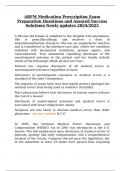ABFM Medication Prescription Exam
Preparation Questions and Assured Success
Solutions Newly updates 2024/2025
A 68-year-old female is admitted to the hospital with pneumonia.
She is penicillin-allergic and receives a dose of
ampicillin/sulbactam (Unasyn). She has an anaphylactic reaction
and is transferred to the intensive-care unit, where her condition
stabilizes with mechanical ventilation, pressor agents, and
corticosteroids. True statements regarding disclosure of the
unanticipated outcome to the patient and her family include
which of the following? (Mark all that are true.)
Federal law requires disclosure of all medical errors or
unanticipated outcomes regardless of harm
Disclosure of unanticipated outcomes or medical errors is a
standard of the Joint Commission
The majority of states have laws that legally protect apologies for
medical errors from being used as evidence of liability
Most physicians believe that disclosure of serious errors reduces
the risk of a lawsuit
Disclosure of unanticipated outcomes and medical errors is
associated with fewer malpractice claims
Surgeons are less likely to disclose medical errors than other
physicians - correct answer B,C,D
In 2005, the National Medical Errors Disclosure and
Compensation (MEDiC) Act of 2005 was introduced in the U.S.
Senate. The bill emphasized open disclosure of medical errors to
patients, apology and early compensation, and a comprehensive
analysis of the events. Congress did not pass the legislation, but
in the meantime at least 34 states have passed laws requiring
,disclosure of medical errors, generally with limited protections
regarding the use of apologies or expressions of regret as
evidence of liability. Since 2001, disclosure to patients and their
families of the outcomes of treatment, including unanticipated
outcomes, has been a standard of the Joint Commission.Some
studies suggest that disclosure results in fewer lawsuits or lower
total payouts, but others show the opposite. It is not yet known
what the net effect will ultimately be on lawsuits related to
disclosure of medical errors as such disclosure becomes the
norm, but one study found that two-thirds of American and
Canadian physicians believe that disclosure reduces the risk of a
lawsuit. That same study, however, found that 98% of those
physicians believed that disclosure of serious errors was the
right thing to do, whether or not they believed it lowered the risk
of litigation. In a study regarding physicians' attitudes toward
disclosing errors to patients, there were several factors
associated with an increased willingness to tell patients about
medical errors. These factors include the belief that doing so
made patients less likely to sue, not being in private practice,
being Canadian rather than a U.S. citizen, and being a surgeon.
An 82-year-old male is admitted to the intensive-care unit with a
3-day history of abdominal pain, nausea, vomiting, and bloody
diarrhea. He has a fever and meets clinical criteria for sepsis.
His chronic medical problems include hypertension,
hyperlipidemia, coronary artery disease, heart failure, type 2
diabetes mellitus, and osteoarthritis. His daily medications
include lisinopril (Prinivil, Zestril), furosemide (Lasix), metformin
(Glucophage), simvastatin (Zocor), and ibuprofen. He has not
been eating or drinking much in the past several days, but his
wife has made sure that he has taken his medications as
prescribed.His initial laboratory results include a BUN of 72
mg/dL (N 8-25) and a serum creatinine level of 3.2 mg/dL
(baseline 1.3; N 0.6-1.5). Despite aggressive fluid resuscitation,
his urine output is only 100 mL in the first 8 hours. A general
, surgeon is consulted and orders abdominal CT with
contrast.Which of the following would be important in the
management of this patient? (Mark all that are true.)
Aggressive hydration and the removal of nephrotoxic agents
Diuretics to increase his urine output
Infusion of dopamine at a low dosage (2 µg/kg/min)
Infusion of sodium bicarbonate prior to administration of
contrast media - correct answer A
Most cases of acute kidney injury (AKI, formerly called acute
renal failure) occur as a result of decreased renal perfusion or
decreased glomerular filtration. Common etiologies include
dehydration from gastrointestinal fluid loss, overaggressive
diuresis, and conditions that reduce effective arterial volume,
such as heart failure, liver failure, and nephrotic syndrome (SOR
C). Restoration of renal perfusion and glomerular filtration are
the cornerstones of treatment for acute prerenal renal failure.
Expansion of the circulating intravascular volume with
intravenous fluids and withholding medications known to affect
glomerular function are important first steps in this patient's
treatment.Both NSAIDs and ACE inhibitors reduce glomerular
filtration and can precipitate AKI, especially in patients with
other contributing factors, such as dehydration. NSAIDs reduce
glomerular filtration by inducing vasoconstriction of the afferent
arterioles through inhibition of cyclooxygenase, which leads to
increased levels of thromboxane A2, a potent vasoconstrictor.
ACE inhibitors reduce glomerular filtration by reducing levels of
angiotensin II, which allows vasodilation of efferent arterioles
and reduces glomerular hydrostatic pressure.Radiocontrast
media are known to be potentially nephrotoxic and are best
avoided in patients with, or at risk for, AKI. Administering sodium
bicarbonate is no longer recommended.Although patients with
nonoliguric renal failure fare better than patients presenting
with oliguria, the use of diuretics to stimulate urine output




